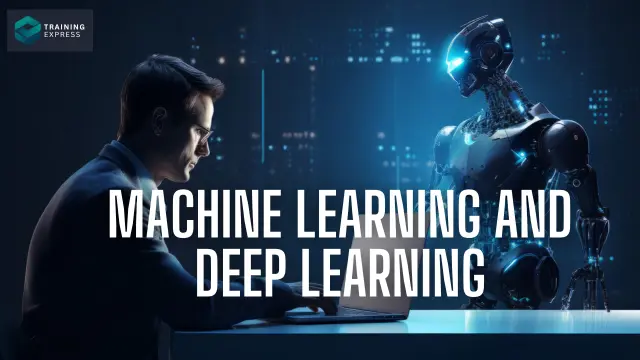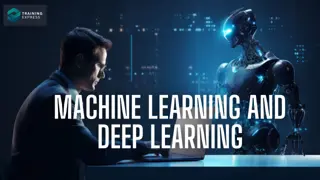
Certification in Machine Learning and Deep Learning
Updated 2025 | 129 Modules Instructor Lead Video Classes | FREE CPD Certificate | 10 CPD Points | Lifetime Access
Summary
- Digital certificate - Free
- Hard copy certificate - Free
- Reed Courses Certificate of Completion - Free
- Tutor is available to students
Add to basket or enquire
Overview
The Certification in Machine Learning and Deep Learning course provides an in-depth guide to understanding intelligent systems. It begins with an introduction and study plan, followed by a detailed explanation of machine learning types, workflows, and applications.
Course Curriculum
- Module 1: Introduction & study plan
- Module 2: Overview of Mechine Learning
- Module 3: Types of Mechine Learning
- Module 4: continuation of types of machine learning
- Module 5: Steps in a typical machine learning workflow
- Module 6: Application of Mechine Learning
- Module 7: Data types & structure
- Module 8: Control Flow & Structure
- Module 9: Libraries for Machine Learning
- Module 10: Loading & preparing data final
- Module 11: Loading and preparing data
- Module 12: Tools and Platforms
- Module 13: Model Deployment
- Module 14: Numpy
- Module 15: Indexing and slicing
- Module 16: Pundas
- Module 17: Indexing and selection
- Module 18: Handling missing data
- Module 19: Data Cleaning and Preprocessing
- Module 20: Handling Duplicates
- Module 21: Data Processing
- Module 22: Data Splitting
- Module 23: Data Transformation
- Module 24: Iterative Process
- Module 25: Exploratory Data Analysis
- Module 26: Visualization Libraries
- Module 27: Advanced Visualization Techniques
- Module 28: Interactive Visualization
- Module 29: Regression
- Module 30: Types of Regression
- Module 31: Lasso Regration
- Module 32: Steps in Regration Analysis
- Module 33: Continuation
- Module 34: Best Practices
- Module 35: Regression Analysis is a Fundamental
- Module 36: Classification
- Module 37: Types of classification
- Module 38: Steps in Classification Analysis
- Module 39: Steps in Classification analysis Continuou.
- Module 40: Best Practices
- Module 41: Classification Analysis
- Module 42: Model Evolution and Hyperparameter tuning
- Module 43: Evaluation Metrics
- Module 44: Continuations of Hyperparameter tuning
- Module 45: Best Practices
- Module 46: Clustering
- Module 47: Types of Clustering Algorithm
- Module 48: Continuations Types of Clustering
- Module 49: Steps in Clustering Analysis
- Module 50: Continuations Steps in Clustering Analysis
- Module 51: Evalution of Clustering
- Module 52: Application of Clustering
- Module 53: Clustering Analysis
- Module 54: Dimensionality Reduction
- Module 55: Continuation of Dimensionally Reduction
- Module 56: Principal Component Analysis (PCA)
- Module 57: Distributed Stochastic Neighbor Embedding
- Module 58: Application of Dimensionality Reduction
- Module 59: Continuation of Application of Dimensionality
- Module 60: Introduction to Deep Learning
- Module 61: Feedforward Propagation
- Module 62: Backpropagation
- Module 63: Recurrent Neural Networks (RNN)
- Module 64: Training Techniques
- Module 65: Model Evaluation
- Module 66: Introduction to Tensorflow and Keras
- Module 67: Continuation of Introduction to Tensorflow and Keras.
- Module 68: Workflow
- Module 69: Keras
- Module 70: Continuation of Keras
- Module 71: Integration
- Module 72: Deep learning Techniques
- Module 73: Continuation of Deep learning techniques
- Module 74: Key Components
- Module 75: Training
- Module 76: Application
- Module 77: Continuation of Application
- Module 78: Recurrent Neural Networks
- Module 79: Continuation of Recurrent Neural Networks.
- Module 80: Training
- Module 81: Varients
- Module 82: Application
- Module 83: RNN
- Module 84: Transfer Learning and Fine Tuning
- Module 85: Continuation Transfer Learning and Fine Tuning
- Module 86: Fine Tuning
- Module 87: Continuation Fine Tuning
- Module 88: Best Practices
- Module 89: Transfer Learning and Fine Tuning are powerful techniques
- Module 90: Advance Deep Learning
- Module 91: Architecture
- Module 92: Training
- Module 93: Training Process
- Module 94: Application
- Module 95: Generative Adversarial Network have
- Module 96: Rainforcement Learning
- Module 97: Reward Signal and Deep Reinforcement
- Module 98: Techniques in Deep Reinforcement Learning
- Module 99: Application of Deep Reinforcement
- Module 100: Deep Reinforcement Learning has demonstrated
- Module 101: Deployment & Model Management
- Module 102: Flask for Web APIs
- Module 103: Example
- Module 104: Dockerization
- Module 105: Example Dockerfile
- Module 106: Flask and Docker provide a powerful combination
- Module 107: Model Management & Monitoring
- Module 108: Continuation of Model Management & Mentoring
- Module 109: Model Monitoring
- Module 110: Continuation of Model Monitoring
- Module 111: Tools and Platforms
- Module 112: By implementing effecting model management
- Module 113: Ethical and Responsible AI
- Module 114: Understanding Bias
- Module 115: Promotion Fairness
- Module 116: Module Ethical Considerations
- Module 117: Tools & Resources
- Module 118: Privacy and Security in ML
- Module 119: Privacy Consideration
- Module 120: Security Consideration
and more....
Certificates
Digital certificate
Digital certificate - Included
Hard copy certificate
Hard copy certificate - Included
Reed Courses Certificate of Completion
Digital certificate - Included
Will be downloadable when all lectures have been completed.
CPD
Curriculum
Course media
Description
Key Features :
- Accredited by CPD
- Top-notch video lessons
- Instant e-certificate
- Entirely online, interactive course with audio voiceover
- Self-paced learning and laptop, tablet, and smartphone-friendly
- 24/7 Learning Assistance
- Discounts on bulk purchases
Learners explore how data is structured, processed, and prepared for models, using libraries like NumPy, Pandas, and others. The course includes data cleaning, handling missing values, removing duplicates, and preprocessing steps. Visualization is taught through various libraries and advanced techniques, helping learners interpret data effectively.
The curriculum covers key algorithms like regression, classification, and clustering, breaking each down into types, steps, best practices, and evaluation metrics. Deep learning is introduced with foundational knowledge on neural networks, backpropagation, and feedforward propagation. Learners study TensorFlow and Keras, learning how to build and train deep learning models.
The course continues into advanced deep learning, including RNNs, GANs, reinforcement learning, and their applications. Deployment is addressed using Flask and Docker, with emphasis on model management, monitoring, and maintenance. Important ethical aspects such as bias, fairness, privacy, and security are also discussed. The course ends with a capstone project, assignments, and additional resources to reinforce learning. Each module is structured to build a strong understanding of machine learning and deep learning systems from start to finish.
Learning Outcomes
- Understand machine learning and deep learning core concepts
- Learn to handle, clean, and prepare data for analysis
- Explore regression, classification, and clustering techniques
- Use Python libraries like NumPy, Pandas, and TensorFlow
- Apply deep learning models using Keras and neural networks
- Understand ethical, privacy, and monitoring in AI systems
Who is this course for?
- Beginners interested in machine learning concepts and workflows
- Data science learners exploring ML and deep learning
- Students aiming to understand Python ML libraries
- Tech enthusiasts seeking AI and model deployment knowledge
- Individuals interested in ethical and responsible AI
Career path
- Machine Learning Assistant
- Data Analyst Intern
- AI Research Assistant
- Junior Python Developer
- Deep Learning Support Analyst
- ML Model Monitoring Assistant
Questions and answers
Currently there are no Q&As for this course. Be the first to ask a question.
Reviews
Currently there are no reviews for this course. Be the first to leave a review.
Provider
Training Express is a premier course provider in the UK, trusted by over 1,000,000 students and 10,000 business partners worldwide. Established by a dedicated team of experts, we specialise in delivering accredited certification and training designed to enhance organisational performance across various sectors and industries. Our comprehensive courses focus on promoting high standards of food hygiene, business wellbeing, and workplace safety.
Our fully branded corporate training solutions have helped over 10,000 businesses reach their goals since our inception. As our learning community grows, we remain committed to providing free digital accredited certificates that support our students' success in their professional lives.
Why Training Express?
- 1,000,000 Students
- 10,000 Business Partners
- 5,000+ Accredited Courses
At Training Express, we develop interactive video-based online courses tailored to meet the critical training needs essential for business success.
Corporate Training Offerings:
- Admin Dashboard
- Dedicated Business Dashboard
- Downloadable Business Account Brochure
- Course Assigning to Individual or Group
- Full Analytical Reporting & User Management
- Dedicated Account Manager
- Instant Certification & Validation
- 24/7 Expert Support & Customer Service
Accreditations and Memberships:
- CPD UK Accredited
- CPD Quality Standards Accredited
- The Quality Licence Scheme (QLS) Endorsement
- Institute of Hospitality Endorsement
- Memberships: ROSPA, UKRLP, AOHT
Legal information
This course is advertised on Reed.co.uk by the Course Provider, whose terms and conditions apply. Purchases are made directly from the Course Provider, and as such, content and materials are supplied by the Course Provider directly. Reed is acting as agent and not reseller in relation to this course. Reed's only responsibility is to facilitate your payment for the course. It is your responsibility to review and agree to the Course Provider's terms and conditions and satisfy yourself as to the suitability of the course you intend to purchase. Reed will not have any responsibility for the content of the course and/or associated materials.

